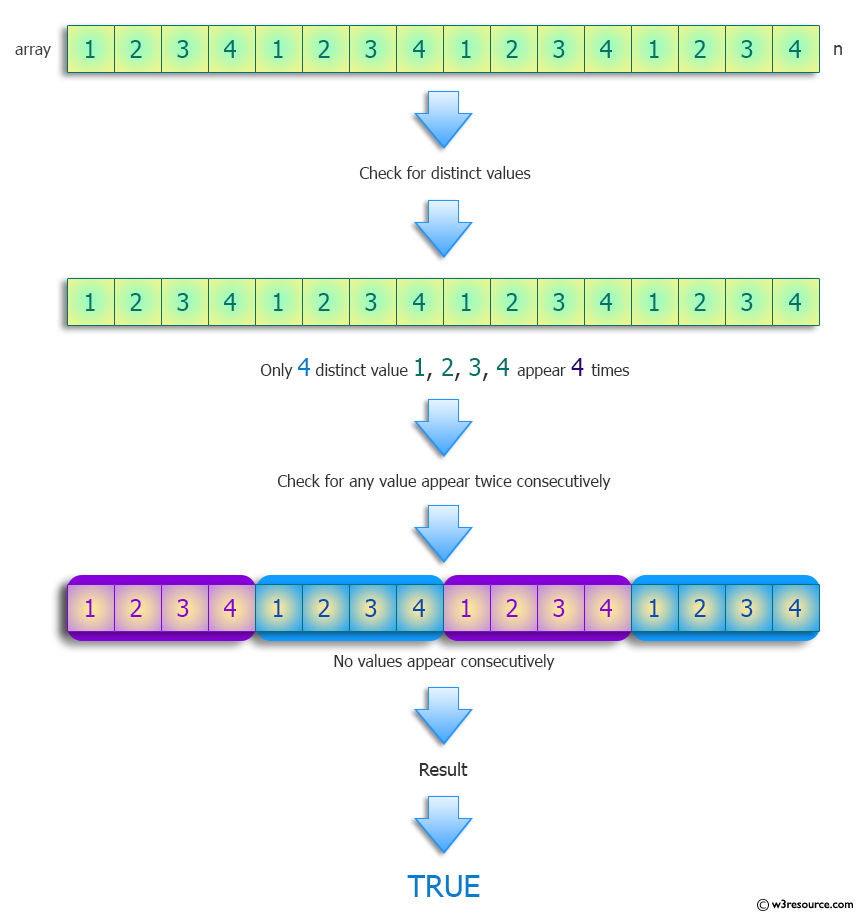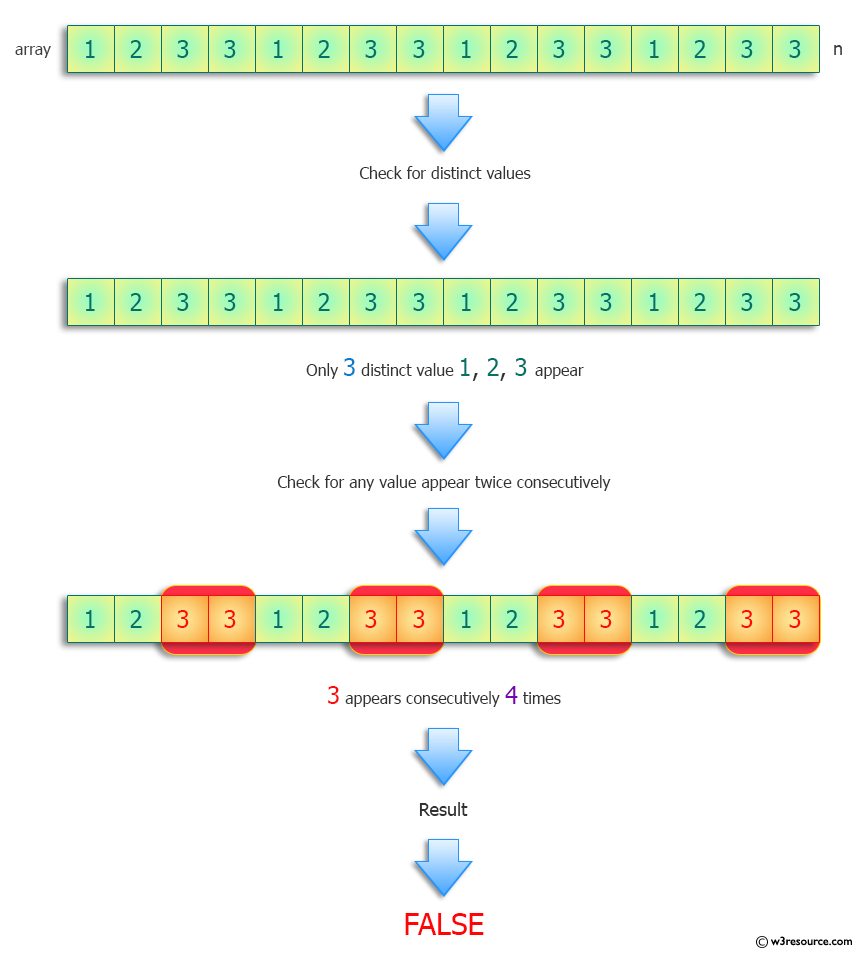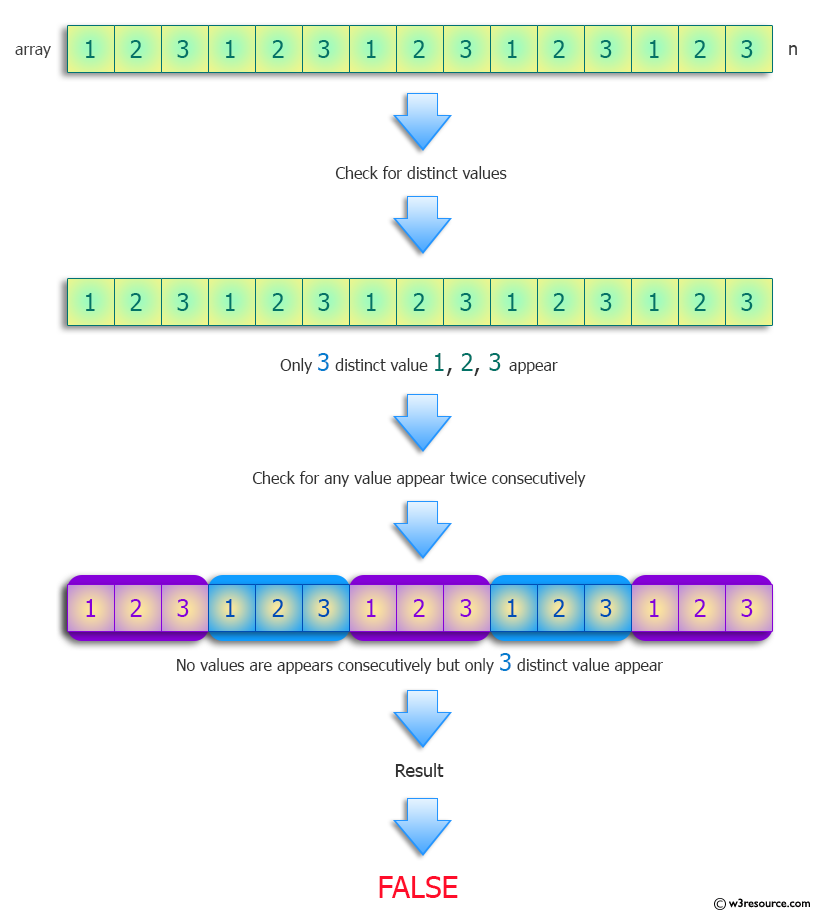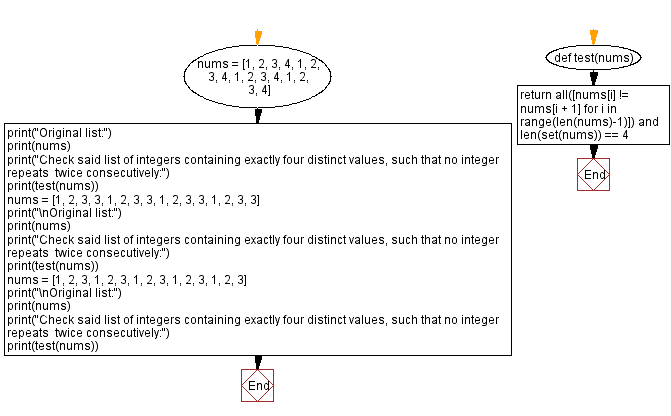Python: List integers containing exactly three distinct values, such that no integer repeats twice consecutively
Four Distinct Values Non-Consecutive
Write a Python program to find a list of integers containing exactly four distinct values, such that no integer repeats twice consecutively among the first twenty entries.
Note: The list needs to have length greater than ten.)
Input: [1, 2, 3, 4, 1, 2, 3, 4, 1, 2, 3, 4, 1, 2, 3, 4] Output: True Input: [1, 2, 3, 3, 1, 2, 3, 3, 1, 2, 3, 3, 1, 2, 3, 3] Output: False Input: [1, 2, 3, 1, 2, 3, 1, 2, 3, 1, 2, 3, 1, 2, 3] Output: False
Visual Presentation:



Sample Solution:
Python Code:
# License: https://bit.ly/3oLErEI
# Define a function named 'test' that takes a list of integers 'nums' as input
def test(nums):
# Check if no integer in 'nums' repeats consecutively and if there are exactly four distinct values in 'nums'
return all([nums[i] != nums[i + 1] for i in range(len(nums) - 1)]) and len(set(nums)) == 4
# Create a list of integers 'nums' with specific elements
nums = [1, 2, 3, 4, 1, 2, 3, 4, 1, 2, 3, 4, 1, 2, 3, 4]
# Print the original list
print("Original list:")
print(nums)
# Print a message indicating the condition being checked on the list
print("Check said list of integers containing exactly four distinct values, such that no integer repeats twice consecutively:")
# Print the result of the test function applied to the 'nums' list
print(test(nums))
# Create a different list of integers 'nums' with specific elements
nums = [1, 2, 3, 3, 1, 2, 3, 3, 1, 2, 3, 3, 1, 2, 3, 3]
# Print the original list
print("\nOriginal list:")
print(nums)
# Print a message indicating the condition being checked on the list
print("Check said list of integers containing exactly four distinct values, such that no integer repeats twice consecutively:")
# Print the result of the test function applied to the modified 'nums' list
print(test(nums))
# Create another list of integers 'nums' with specific elements
nums = [1, 2, 3, 1, 2, 3, 1, 2, 3, 1, 2, 3, 1, 2, 3]
# Print the original list
print("\nOriginal list:")
print(nums)
# Print a message indicating the condition being checked on the list
print("Check said list of integers containing exactly four distinct values, such that no integer repeats twice consecutively:")
# Print the result of the test function applied to the modified 'nums' list
print(test(nums))
Sample Output:
Original list: [1, 2, 3, 4, 1, 2, 3, 4, 1, 2, 3, 4, 1, 2, 3, 4] Check said list of integers containing exactly four distinct values, such that no integer repeats twice consecutively: True Original list: [1, 2, 3, 3, 1, 2, 3, 3, 1, 2, 3, 3, 1, 2, 3, 3] Check said list of integers containing exactly four distinct values, such that no integer repeats twice consecutively: False Original list: [1, 2, 3, 1, 2, 3, 1, 2, 3, 1, 2, 3, 1, 2, 3] Check said list of integers containing exactly four distinct values, such that no integer repeats twice consecutively: False
Flowchart:

For more Practice: Solve these Related Problems:
- Write a Python program to verify that a list contains exactly four distinct values and that no value is repeated consecutively.
- Write a Python program to count unique elements in a list and check that none appear twice in a row within the first twenty entries.
- Write a Python program to iterate over a list and ensure it has exactly four unique numbers and that no adjacent pair are identical.
- Write a Python program to use slicing and set operations to confirm that the first twenty elements of a list have four distinct values with no consecutive duplicates.
Go to:
Previous: Split a string of words separated by commas and spaces into 2 lists: words and separators.
Next: Separate Parentheses Groups Perfectly.
Python Code Editor :
Have another way to solve this solution? Contribute your code (and comments) through Disqus.
What is the difficulty level of this exercise?
Test your Programming skills with w3resource's quiz.
